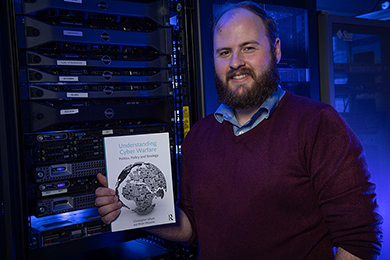News
Whyte publishes new book on cyberwarfare

Understanding Cyber Warfare
By Rosemarie O’Connor
June 3, 2019
“Understanding Cyber Warfare: Politics, Policy and Strategy” provides an accessible introduction into the historical, technical, and strategic contexts of cyber conflict for graduate and undergraduate students.
The book is co-authored by Wilder School Assistant Professor of Homeland Security & Emergency Preparedness, Christopher Whyte and Brian Mazanec, a professor of cyber warfare at George Mason University.
“There's not much in this field that you can actually take and hand to an undergraduate or a graduate student,” he said, as cybersecurity is still a relatively new field of research.
Whyte describes this book as an “intermediate resource” that fills a niche in the study of cyber-criminal conflict. This book incorporates international relations and political science theories into the topic of national security.
“I wanted to make sure that we provided the resources to students,” Whyte said, “so that they could effectively frame these concepts in relatively simple terms.”
The first chapters of the book explore the historical trajectory of . It starts with World War I and II and development of code makers. This continued with the Enigma machine, invented by German engineer Arthur Scherbius at the end of WWI.
“Things that were so sophisticated on the Allied side,” he said. “We literally had to build the first computers in order to actually combat the ability of the Germans and other axis powers.”
Later on, the text explores the Department of Defense’s ARPA project, which lead to the internet. Whyte describes this as “the most dynamic information revolution in human history.”
“Information revolutions lead to broad scope global conflict,” Whyte said. This speeds up the pace of society which results in an “increase in class conflict, in political conflict, in social conflicts and economic contestation.”
Whyte said the important thing to understand is that cyber warfare is not static. “Every few years since about 1986, we come across a new flavor of cyber threat.” The shape of that threat changes each time.
“We are increasingly viewing states as not fighting with each other in the traditional sense, but rather as a constant form of low-level pressure,” he said.
Whyte said that students are most interested in how cybersecurity fits into the global context and international relations. With an undergraduate degree in International Relations and Economics, Whyte has the knowledge to frame these issues effectively for his students.
He became interested in cybersecurity while completing his master’s degree in Political Science at George Mason University. In his second year, he served as a junior research assistant to Irving Lachow at The Center for a New American Security. It was then that he realized the vital role it plays in national security.
He described how systematic shut down of cyber capabilities could greatly diminish national power, “without a shot being fired.”
“It's not esoteric,” Whyte said. The next generation of students can confront these threats, “with a basic knowledge of foundational concepts and principals, and some history as well.”
This is precisely what Whyte’s first book aims to do.